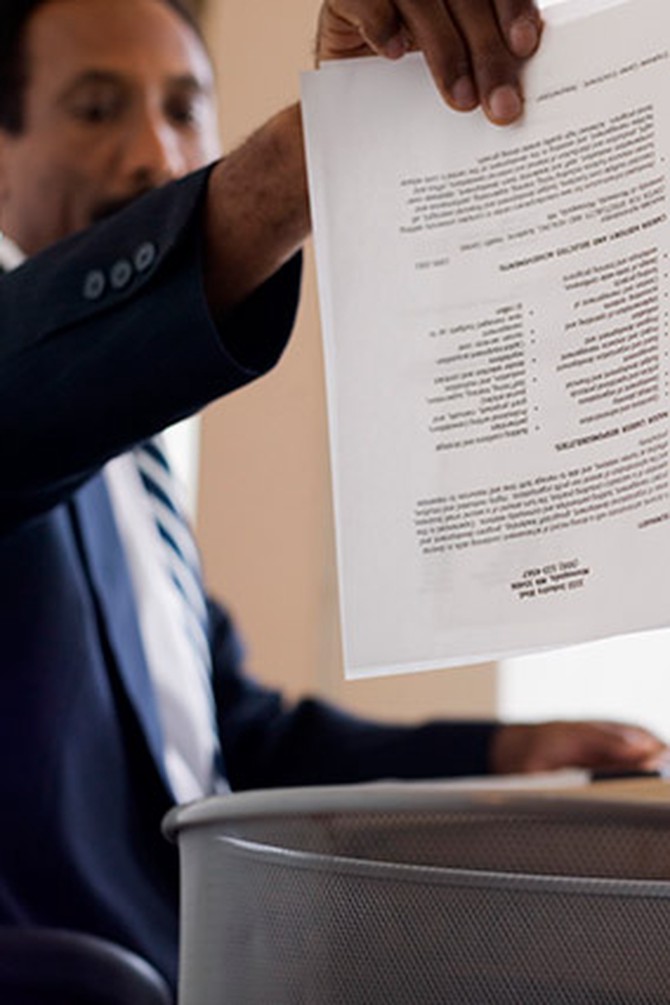4 Secrets of People Who Always Get the Job Offer
Smart moves you can steal from candidates who nail it every time.
By Lynn Andriani

Photo: Thinkstock
Secret #1: They Don't Rely on Job Boards
It's a given that, these days, almost any employment search is going to begin online (CareerBuilder's 2013 Candidate Behavior Study shows that about 80 percent of job seekers use job boards). The truth is, though, that the majority of positions you see posted are already filled, says Nicole Williams, career expert for LinkedIn. Just 18 percent of external hires can be attributed to job boards, according to the recruiting site CareerXroads. Successful candidates use boards to learn about the kinds of roles a company they're interested in is trying to fill (and what specific skills it's looking for), Williams says, and then they network to find people they know who work at that company and can help them land an interview.
One more thing: Jessica Rohman, senior content producer at the HR-industry consulting, research and training firm Great Place to Work, says the average referral bonus at companies on its Best Companies to Work For list is $3,600, and the bonus can go up to $20,000—which underscores the importance companies place on hiring employees who are recommended by people they trust. So don't feel shy about reaching out to that friend of a friend, since helping you out could pay off for her.
One more thing: Jessica Rohman, senior content producer at the HR-industry consulting, research and training firm Great Place to Work, says the average referral bonus at companies on its Best Companies to Work For list is $3,600, and the bonus can go up to $20,000—which underscores the importance companies place on hiring employees who are recommended by people they trust. So don't feel shy about reaching out to that friend of a friend, since helping you out could pay off for her.

Photo: Thinkstock
Secret #2: They Use Their 6 Seconds Wisely
A 2012 study by The Ladders found that the amount of time it takes a recruiter to decide whether a resume belongs in the "yes" or "no" pile is a lightning-fast six seconds. Nearly every candidate knows the "objective" and "references available upon request" lines just take up space stating the obvious. HR consultant and resume expert Christopher Fields says scanability is key. A winning resume uses language that mirrors the job posting, and includes verbatim words that will jump out at the recruiter (e.g., if a company's website says its employees go "above and beyond" on their clients' behalf, use "above and beyond" to explain your commitment to business relationships). The best resumes are also usually formatted in reverse chronological order.
One more thing: Resumes with a font size of 11 result in more interviews than ones with smaller or larger type do. Among serif fonts, the easiest to read are Times, Georgia, Bell MT, Goudy Old Style and Garamond; for sans serif, use Arial, Tahoma, Century Gothic or Lucida Sans.
One more thing: Resumes with a font size of 11 result in more interviews than ones with smaller or larger type do. Among serif fonts, the easiest to read are Times, Georgia, Bell MT, Goudy Old Style and Garamond; for sans serif, use Arial, Tahoma, Century Gothic or Lucida Sans.

Photo: Thinkstock
Secret #3: Their Social-Media Profile Is (Almost) Better Than Their Resume
Williams has seen a huge change in the past two years when it comes to how hiring managers check out candidates on social media. It used to be that they looked for red flags and inappropriate posts. But now, Williams says, any job seeker "has to have a digital footprint, or they'll be considered digitally illiterate." Candidates who get interview requests may have the personal photos on their Facebook profiles locked down, but their Twitter feeds are full of interesting, relevant comments about their industry (even if they work in a field like accounting, says Williams).
One more thing: Williams says she's seeing more non-writers write opinion pieces or blog posts for The Huffington Post—which can be a great way to get your name to turn up in an Internet search with job-boosting results. You can now also publish blog-style content on LinkedIn.
One more thing: Williams says she's seeing more non-writers write opinion pieces or blog posts for The Huffington Post—which can be a great way to get your name to turn up in an Internet search with job-boosting results. You can now also publish blog-style content on LinkedIn.

Photo: Thinkstock
Secret #4: They Can Express Enthusiasm Without Emoticons
Even though you're grinning ear to ear when you see a "We'd love to have you in for an interview" note in your inbox, you know better than to include a smiley face in your return email. The successful job seeker may strip out the exclamation points in her (speedy) reply, but she replaces them with an honest and specific sentence about why she's so excited about the opportunity, says Rohman.
One more thing: Williams says people who get the offer usually connect with the recruiter on a personal level. That could mean that when they write back confirming the interview, they might mention a small compliment about the person who introduced them. Or, if it's a last-minute request for a meeting the same day, they let the recruiter know, in advance, that they wouldn't normally wear jeans to an interview but that they thought they didn't have any meetings that day.
One more thing: Williams says people who get the offer usually connect with the recruiter on a personal level. That could mean that when they write back confirming the interview, they might mention a small compliment about the person who introduced them. Or, if it's a last-minute request for a meeting the same day, they let the recruiter know, in advance, that they wouldn't normally wear jeans to an interview but that they thought they didn't have any meetings that day.
Published 04/01/2014

